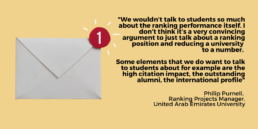Rankings and reputation are entwined but reputation is about more than rankings. That was the key conclusion from a World 100-moderated session at the THE Arab Rankings Forum on 27 July. World 100 Director Louise Simpson discussed ‘Using Rankings to Enhance Reputation’ with a panel of experts from some of the biggest universities in the Arab region.
‘Reputation strategy overlaps with our rankings strategy’, states Noura Anwar Abdel-Fatah, Associate professor and coordinator of the international ranking office, Cairo University. ‘Each effects the other….you cannot make them totally independent from each other’.
Despite this undeniable link, referenced by all speakers, it was clear that universities approach rankings in very different ways. For example, at Cairo, they focus on an explicit list of 8 prestigious rankings. influenced by the rankings programme of Egypt’s Ministry for Higher Education and Scientific Research (MoHESR) having a specific rankings programme. Amongst other goals, they have set a target of 10 Egyptian Institutions to feature in the top 500 world rankings by 2030.
In contrast for Mark Mulqueen, Director of global branding and communications, King Abdullah University of Science and Technology, whilst acknowledging their importance to some audiences, rankings should not be the key focus for understanding and establishing a university’s reputation. He stated that rankings are ‘a piece of the reputation cake but just one piece. I think people like us, and leadership care about ranking often more than external stakeholders such as national and local government and even industry’.
‘A university’s reputation is about other factors; if the rankings evolved and start measuring in a more sophisticated way than simply citations and a few other factors that would mean they would become more important to the message. Over the past 3 years, we have built a well-resourced and high-impact global reputation strategy and ranking has been secondary to that ‘.

Stakeholder Communications
The importance of stakeholder communications in building reputation is well understood. The panel discussed the need for a a differentiated approach to the use of rankings, with some audiences finding them more relevant than others.
Philip Purnell, Ranking projects manager, United Arab Emirates University, stated ‘we communicate with all stakeholders about all the great things our university is doing and how joining us can help them in their respective goals.’ He continued by saying, “We wouldn’t talk to students so much about the ranking performance itself. I don’t think it’s a very convincing argument to just talk about a ranking position and reducing a university to a number.
‘Some elements that we do want to talk to students about for example are the high citation impact, the outstanding alumni, the international profile. But many students will also be looking at things that can’t be measured by rankings; for example, what their family and friends think of a university’.
The message from the panel is to combine rankings with storytelling and use rankings to start a conversation. This was echoed by Nathalie Bouldoukian, Director of quality assurance and institutional advancement, American University of the Middle East. She stated that is vital “to share the results of the rankings to all stakeholders because we believe this is the moment where we can celebrate this milestone in the journey of the university. It is also important to complement this and to further amplify the reputation by continuously sharing and communicating our success stories and testimonials and consistent messages to show how this excellence is being reflected in the rankings.’

What rankings don’t measure?
As part of the ongoing debate about rankings methodology, Louise asked the panel what changes they would like to see to ensure that a system that better represents the reputation of an institution.
Mulqueen commented. “I’d try to dial back on the purely academic performance. I think many universities, including KAUST, have a huge impact on the economy and the lower levels socioeconomic, NGO, not-for-profit area, not just the big traction of industry and job creation. It retains your own nation’s most talented people.” He would reduce the focus on facilities and contextualise them more within the context of the learning experience. “If you’re going to pay or partly pay for your child to go to college you want them to come out as a well-formed and well-educated person. It’s hard to measure but you’d love to see that to the fore and the academic piece dialled back. The wider society is never going to care about citations”.


